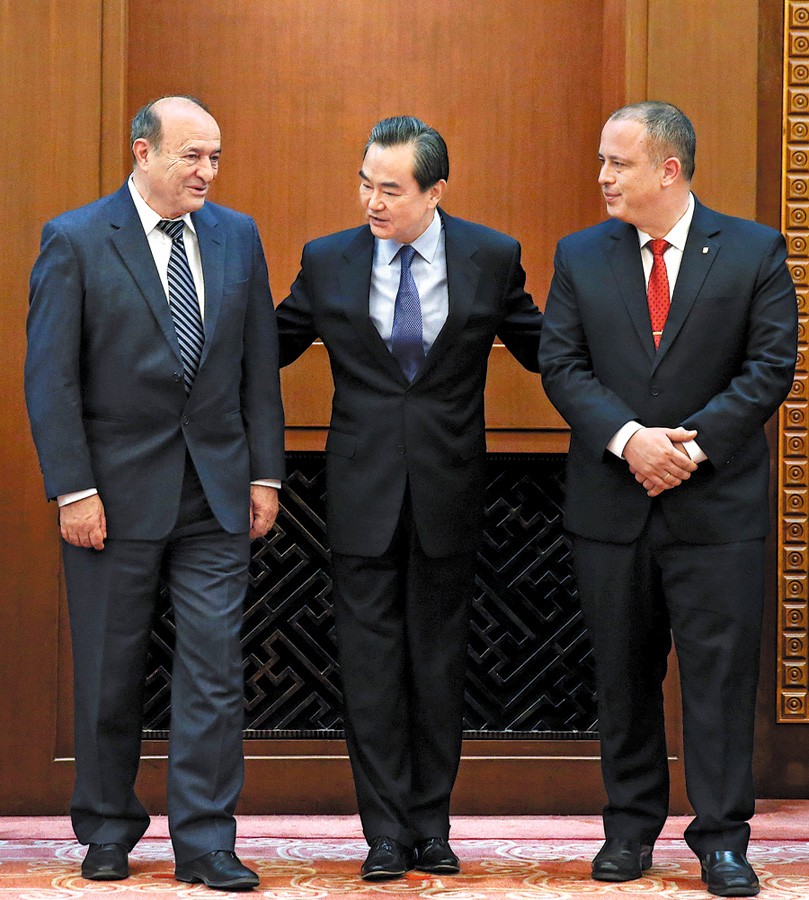Valuable lessons for peaceful resolution between the Palestinians and Israel


Last week, Mr. Yehiel Bar, deputy speaker of the Israeli Knesset, and Nabil Shaath, Palestinian chief negotiator and former acting prime minister of the Palestinian National Authority, met in Beijing as Beijing hosted a two-day symposium on the Israeli-Palestinian peace process. As reported, all parties to the discussions shared a common view of advocating a “two state solution” as a peaceful resolution of the conflict between Israel and the Palestinians.
This Beijing symposium may in the future prove to be a constructive milestone in the long and difficult negotiation process between the Palestinians and Israel. Should the two sides adopt the core lessons from China's development model, the conflict may reshape its course. The term Beijing Consensus, which was coined over a decade ago and extrapolated by leading scholars worldwide, ponders about the essence of China's successful development model. The heart of the Beijing Consensus emphasizes the pragmatic use of innovation and experimentation in the service of equitable, peaceful, high-quality economic growth vis-a-vis defense of national borders and interests. Along these lines of stable politics and high-speed economic growth, China overcame great challenges and over a period of less than four decades made historical achievements. It seems worthy, therefore, to sow innovation, investment and experimentation as the seeds for the resolution of the conflict between the Palestinians and Israel.
Adopting a narrative that borrows from the Beijing Consensus and centers on innovation, investment and experimentation requires the parties' serious consideration. As shown by international research institutions, a great deal of the Palestinians' problems derive from poverty. Innovation, investment and experimentation have proved useful in eradicating poverty in China. We can only imagine the result should these tools be implemented for eradication of the poverty of Palestinians, changing the dynamics between the two parties. In fact, Palestinians and Israelis do not need to cross the ocean to understand the positive traits of innovation, investment and experimentation. These values were implemented in the discourse between Israel and Jordan. Two decades ago, Israel and Jordan changed the leading narrative in their relations, leaving behind a long and bloody history. The new narrative is based on win-win cooperation, with economic cooperation at its backbone. In the spirit of innovation, investment and experimentation, joint industrial parks between Israel and Jordan were established. Over the last two decades, thousands of Jordanians have been employed in these special economic zones, producing industrial and agricultural goods. These parks received the support of the US, providing duty-free export exemptions for goods produced in the parks. These special economic zones have greatly contributed to the change of discourse and ultimately the normalization of the relations between Israel and Jordan.
Over the reform period, China has developed a special expertise in investing and finding innovative solutions that promote economic growth. In fact, this is one of the fundamental elements of the Belt and Road Initiative, driving the establishment of dozens of specialized industrial parks. China can assume a great role in the resolution of the conflict between the Israelis and Palestinians by investing in and promoting new industrial projects shared by China, Israel and the Palestinians. China can provide the knowhow for modernization of the infrastructure in poor Palestinian areas. The China-led Asian Infrastructure Development Bank is a suitable source for financing these projects. More importantly, this will relieve tension and improve the starting point of the discussions for the resolution of the conflict between the parties.
Recently, voices in various international forums have been loudly advocating competing historical narratives concerning the dispute, further complicating the combustible situation. As reiterated by the iconic late Israeli President Shimon Peres, if a problem has no solution, it may not be a problem, but a fact not to be solved, but to be coped with over time. It seems that economic development can be a key driving force in shifting to a new and positive paradigm of cooperation. Finally, along these lines, it can be said that innovation, investment and experimentation are valuable lessons from the Beijing Consensus that can be used for the peaceful resolution of the conflict between the Palestinians and Israel.
Hadas Peled is an Israeli lawyer and PhD candidate at Tsinghua University School of Law. Her research and practice focus on international investment law and China-Israel legal and culture exchange.
The opinions expressed here are those of the writer and do not represent the views of China Daily and China Daily website.































